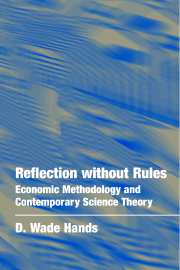Book contents
- Frontmatter
- Contents
- Preface
- 1 Introduction
- 2 The Methodological Tradition in Economics
- 3 The Breakdown of the Received View within the Philosophy of Science
- 4 The Naturalistic Turn
- 5 The Sociological Turn
- 6 Pragmatism, Discourse, and Situatedness
- 7 Recent Developments in Economic Methodology
- 8 The Economic Turn
- 9 Conclusion
- References
- Web Sites
- Index
9 - Conclusion
Published online by Cambridge University Press: 08 January 2010
- Frontmatter
- Contents
- Preface
- 1 Introduction
- 2 The Methodological Tradition in Economics
- 3 The Breakdown of the Received View within the Philosophy of Science
- 4 The Naturalistic Turn
- 5 The Sociological Turn
- 6 Pragmatism, Discourse, and Situatedness
- 7 Recent Developments in Economic Methodology
- 8 The Economic Turn
- 9 Conclusion
- References
- Web Sites
- Index
Summary
To think that people trained in logic and philosophy should actually contribute to the solution of major theoretical problems in the sciences sounds presumptuous. Mainly it was naive. The enterprise assumes, quite mistakenly, that one can extract the theories of a science from their disciplinary culture and analyze them in the abstract. Later analytic philosophers of science were thus victims of an assumption they adopted uncritically from their logical empiricist elders. The typical result has been the creation of relatively isolated subdisciplines populated by philosophers and a few scientific sympathizers. The sciences in question have continued to develop following their own dynamics.
[Giere 1999, p. 16]The previous eight chapters have covered a vast amount of ground and it is now time to take stock and reflect more generally on the overall project. Although the previous chapters have surveyed science theory and economic methodology, and systematically examined various relationships between the two, the title was not “Surveying Methodology and the Literature Relevant to It.” The title is Reflection without Rules, and that title was designed to convey a two-pronged assertion about the recent methodological literature: (1) that simple rules-based economic methodology has quietly and unceremoniously passed from the scene, and (2) that its disappearance need not be, and has not been, the death knell for philosophical and science-theoretical reflection on, and involvement with, the discipline of economics. In fact, the passage has actually facilitated an extremely fertile harvest of new and interesting reflections on a wide array of broadly methodological topics.
- Type
- Chapter
- Information
- Reflection without RulesEconomic Methodology and Contemporary Science Theory, pp. 393 - 407Publisher: Cambridge University PressPrint publication year: 2001



